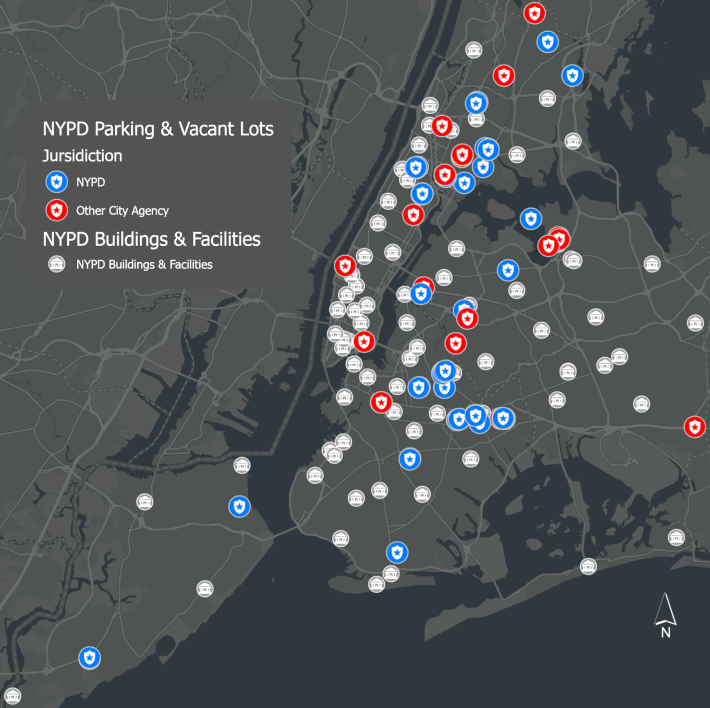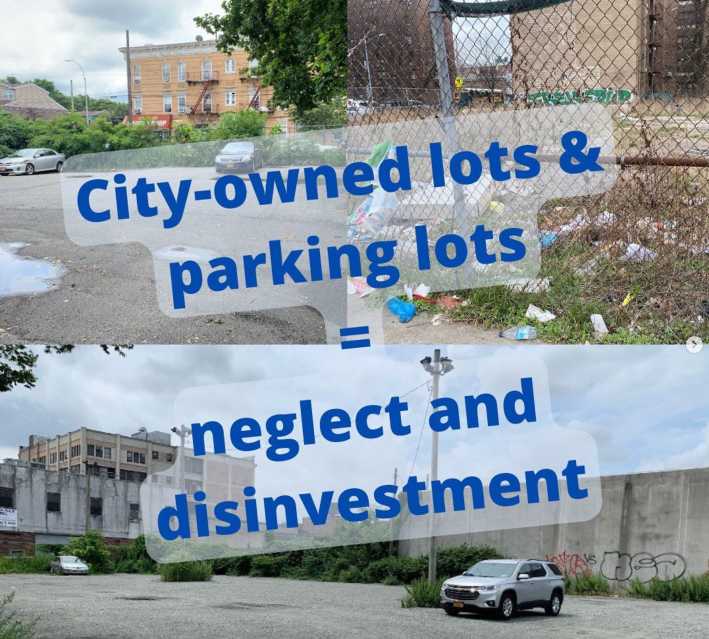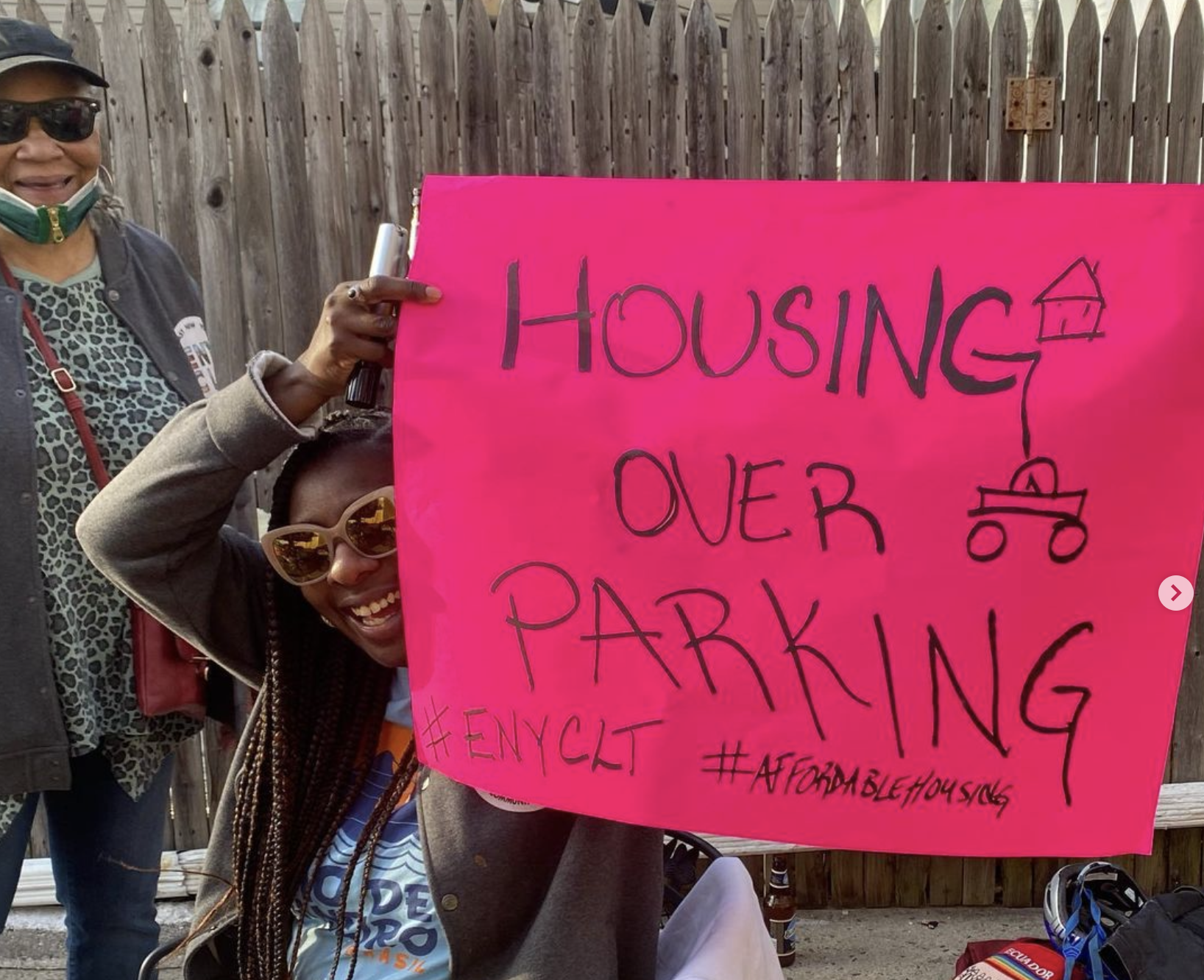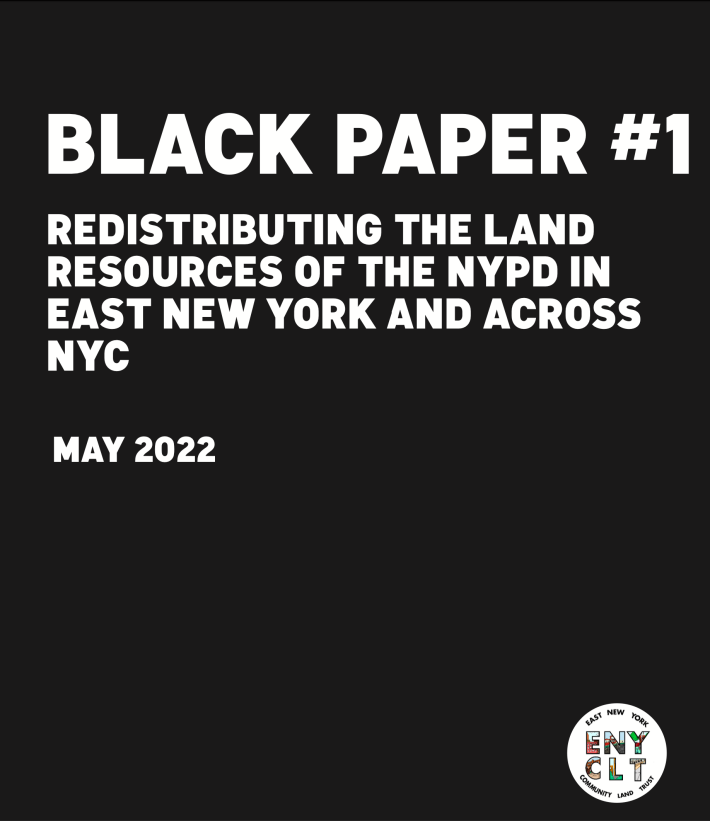The NYPD is using 145 vacant, city-owned lots for parking — just over half of which could be put to better use as affordable housing or manufacturing and commercial space, according to a new report.
The East New York Community Land Trust report, "Redistributing the Land Resources of the NYPD in East New York and Across NYC," will be released at a rally later on Saturday by the not-for-profit collective of East New York and Brownsville residents that wants to acquire title to some of the lots.
The report found that 73 lots in five community districts (three in Brooklyn and two in the Bronx) could be put to better uses than private car storage for officers because they're junk-strewn and aren't used anywhere near capacity. The group made its determination using site surveys and archival data available through Google.
More than two-thirds of the lots — some of which under the jurisdiction of the NYPD while others are used by the NYPD but assigned to other agencies — are in community districts in some of the poorest areas of the city, all of them "overwhelmingly concentrated in communities of color," the report says. The remaining 72 of the 145 lots (see map below) are not suitable for development because they're well maintained, used at or near capacity, or are attached to a NYPD building, the report determined.

"There are 73 underutilized NYPD lots with 1.3 million square feet that we believe have significant community-led development potential in Brooklyn and the Bronx. These lots should be transferred to [community land trusts] across the city," the report states, noting that the 21 lots in East New York could provide 30,000 square feet of residential and 70,000 square feet of manufacturing space.
The report identified:
- A cluster of 11 lots in the East New York Industrial Business Zone.
- A 25,000-square-foot parking lot in East New York used for NYPD parking that is zoned for residential use. (The group wants to build 60 affordable coop/condo units, a ground-floor community facility with open space and a rooftop garden.)
- 18 lots in Ocean Hill-Brownsville zoned for residential use, with eight zoned for mixed-use development.
- 27 lots in Bushwick, which could provide about 120,000 square feet of residential space.
- Five lots in Hunts Point zoned for mixed-use development that could accommodate up to 65,000 square feet of residential development with ground floor commercial.
- Two lots in Mott Haven-Port Morris with the potential of more than 900,000 square feet of development.
The report argued that the transfer of such land to community trusts isn't unusual, citing an NYPD lot in Manhattan and one in Queens that were recently deeded to developers for mixed-use construction.

“For too long the community of East New York, and others like it, have had to endure neglect and divestment from both private and public institutions," said Boris Santos, the East New York Community Land Trust board treasurer, demanding that the city turn over to the group the lot at 987 Sutter Ave., which is used by officers of the 75th Precinct.
The land trust's demand for the undeveloped land comes as some communities across the city are begging for more parking space for officers' vehicles — because of the illegal and unsafe parking practices around station houses, where sidewalks, crosswalks, fire hydrants, bus and bike lanes and even entire blocks are clogged with "combat parked" cars. A recent Streetsblog article found that at least 18 of the city's 59 community boards had submitted requests for new or revamped campuses for their cops in their Fiscal Year 2023 “Statements of Community District Needs and Community Board Budget Requests,” citing the congestion of cops' illegally parked cars. At other precincts, however, for example, the 50th Precinct in The Bronx, the illegal parking persists even when officers have adequate spaces a short walk from their workplace.
Council Member Sandy Nurse, who represents parts of East New York and was to speak at the rally, said that the city's surrender of the lots for police parking showed its callous and inequitable approach to those communities.
"For years, the city has said that we must utilize every available tool and asset at our disposal to address the affordable housing crisis," she said. "At the same time, as the [report] illustrates, the city has been surrendering scarce, developable vacant land to the NYPD for purposes — including personal employee parking lots — that do not house our neighbors. Housing justice is directly tied with racial justice, as illustrated by the concentration of these misused lots in the same communities that are impacted by abusive policing. The city must act on its commitment and create and preserve deeply and permanently affordable housing in the communities that need it the most."
The city owns the lots mostly because of foreclosures, the report says — a remnant of the disinvestment of the 1970s, when many owners abandoned properties. Debra Ack, the land trust board secretary, remembered as a child doing flips on mattresses dumped in such vacant lots. “Those were our playgrounds,” the report quoted her as saying.
Even as essential services such as sanitation, street repair, libraries and park maintenance fled East New York and communities like it in the past several decades, the 75th Precinct ranks as the fourth-best-resourced in the city, with 471 full-time employees and a budget of $28.4 million in the last fiscal year, according to the Office of Management and Budget.
Given its relative wealth, the report reasons, the 75th can spare some land for the locals: "While New York City has rebounded since the 1970s, East New York continues to be left behind," it says. "The neighborhood is in the midst of a local economic crisis, felt through extreme housing instability, a high rate of homelessness and chronic unemployment. In 2016, Mayor de Blasio’s administration rezoned East New York, promising $17 million in investments and 3,900 jobs. Six years later, residents are still waiting. ... In East New York, NYPD-controlled public vacant land and parking lots present exciting opportunities to address housing, commercial and industrial needs. Residents envision and demand a more creative use of this public land."
Neither the Mayor's Office nor the NYPD responded to a request for comment.







